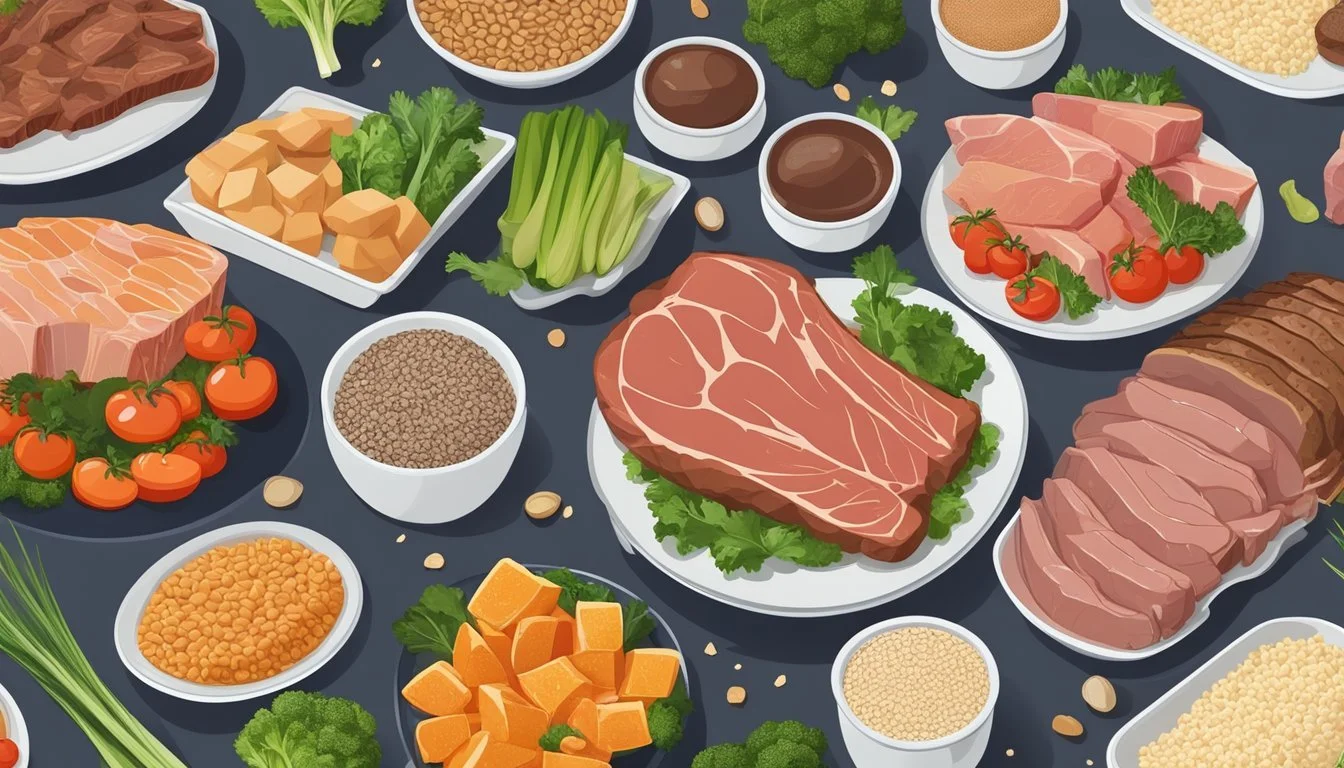Soothing Foods That Calm Acid Reflux Naturally
Acid reflux, commonly known as GERD, can be a persistent and uncomfortable condition. Many individuals suffering from acid reflux often seek relief through dietary changes. By understanding which foods can help manage and alleviate the symptoms of acid reflux, individuals can make more informed choices that contribute to their overall well-being.
Identifying the right foods can be crucial for minimizing the discomfort associated with acid reflux. While there are various treatment options available, diet adjustments often provide a natural and effective approach. This article explores the different types of foods that can help prevent or reduce acid reflux symptoms, offering practical insights for those looking to ease their digestive issues through better dietary habits.
1) Ginger Tea
Ginger tea is commonly recommended for easing acid reflux symptoms. Its alkaline and anti-inflammatory properties can help soothe the stomach.
Many people find relief from heartburn by sipping ginger tea, especially during the early symptoms. The tea contains compounds such as gingerol and shogaols, which contribute to its soothing effects.
Ginger tea is easily made by steeping fresh ginger slices in hot water for several minutes. Store-bought ginger tea bags are also available and can be a convenient option.
It's important to consume ginger in moderate amounts, as excessive intake may aggravate symptoms for some individuals. Incorporating ginger tea into a balanced diet could be a natural way to manage acid reflux.
2) Bananas
Bananas are a popular fruit known to help manage acid reflux.
Their naturally low acidity makes them gentle on the stomach. Ripe bananas, with a pH of around 6.5, are particularly effective in this regard. They seldom trigger acid reflux symptoms, making them a safe choice for many sufferers.
Bananas are rich in potassium, which can help balance stomach pH and reduce acid. Additionally, their high fiber content aids in digestive health, promoting regular bowel movements and reducing the chances of acid reflux.
Some individuals may find that unripe bananas increase acidity. This is due to higher levels of organic acids present before full ripening. Most people should consume fully ripe bananas to avoid any discomfort.
3) Oatmeal
Oatmeal stands out as a beneficial food for those dealing with reflux. Its high fiber content can help regulate digestion and reduce acid production in the stomach. This makes it a gentle option for individuals who experience frequent heartburn.
Eating oatmeal helps to coat the esophagus, providing a soothing barrier against stomach acid. This protective effect is particularly useful for minimizing discomfort.
Oatmeal is also versatile and can be prepared in various ways. It can be topped with non-citrus fruits like bananas or pears, which are less likely to trigger reflux.
Incorporating oatmeal into the diet is practical and simple. It can be made ahead of time as overnight oats, making it a convenient option for busy mornings.
Overall, oatmeal is a smart choice for those looking to manage reflux symptoms through diet. Its mild nature and nutritional benefits make it a valuable addition to any meal plan aimed at reducing heartburn.
4) Green Vegetables
Green vegetables play a significant role in managing acid reflux. They are low in fat and sugar, making them ideal choices for those dealing with this condition. Asparagus, broccoli, and green beans are particularly beneficial.
Broccoli is rich in fiber and low in acid, which helps reduce stomach acidity. Similarly, green beans are gentle on the digestive system, offering a fiber boost without aggravating symptoms.
Spinach is another excellent option, providing a healthy dose of vitamins and minerals. It can be easily incorporated into salads and smoothies. By opting for these green vegetables, individuals can create a more reflux-friendly diet.
5) Non-citrus Fruits
Non-citrus fruits are a vital part of a diet for those dealing with acid reflux. They offer essential nutrients without triggering GERD symptoms.
Bananas are among the best options. They are low in acid and can help soothe the digestive tract.
Melons, such as cantaloupe and honeydew, are also excellent choices. They have a slightly alkaline nature, which can help neutralize stomach acid.
Apples and pears provide fiber and vitamins while being gentle on the stomach. These fruits can be consumed fresh or cooked, making them versatile additions to meals.
Berries like strawberries and blueberries, though slightly more acidic than melons, are generally safe for many people with reflux.
Including a variety of non-citrus fruits in the daily diet can help manage and reduce reflux symptoms effectively.
6) Lean Meats
Lean meats can be a good choice for those managing acid reflux symptoms. These meats include options like skinless chicken, turkey, and seafood. They are lower in fat compared to other meats, which can help reduce the risk of reflux.
Fatty or greasy foods are known to exacerbate GERD symptoms. Therefore, by choosing lean meats, individuals can enjoy protein-rich meals without triggering discomfort. These meats can be incorporated into various recipes, making them a versatile option.
While lean meats are beneficial, it is essential to avoid cooking methods that add unnecessary fat. Grilling, baking, or steaming lean meats are recommended. Avoid frying or adding rich, heavy sauces that might counteract the benefits.
7) Aloe Vera Juice
Aloe vera juice is frequently touted for its soothing properties. Research indicates it may help with acid reflux by calming the inflammation in the digestive tract lining. The juice can be consumed daily to achieve these benefits.
For those considering aloe vera juice, it is recommended to use pure, high-quality juice without added sugars or artificial ingredients.
Starting with a small amount and gradually increasing can help gauge tolerance. Some find relief within a few days, while it may take up to two weeks for others.
Aside from its anti-inflammatory effects, aloe vera juice offers additional vitamins and minerals such as vitamin C, calcium, and magnesium. This makes it a beneficial inclusion in a diet for acid reflux management.
8) Chamomile Tea
Chamomile tea is a popular herbal remedy for various ailments, including acid reflux. It has anti-inflammatory properties that can help soothe the digestive tract.
The tea contains compounds like bisabolol, which may reduce inflammation and relieve symptoms of gastroesophageal reflux disease (GERD).
To prepare chamomile tea, steep a tea bag or dried flowers in hot water for 5-10 minutes.
Incorporating chamomile tea into a daily routine can potentially alleviate discomfort caused by acid reflux.
It's recommended to source high-quality chamomile to maximize its benefits.
9) Melon
Melons, such as watermelon and cantaloupe, are excellent choices for individuals dealing with acid reflux. Their high water content helps to dilute stomach acid, reducing the likelihood of acid reflux symptoms.
Watermelon is particularly hydrating, with about 92% water content. This hydration assists in maintaining a balance in stomach acidity. It also contains antioxidants like lycopene and vitamin C, which can combat inflammation.
Cantaloupe is another beneficial melon. It is low in acid and high in water content, making it soothing for the digestive system. The alkaline nature of cantaloupe helps neutralize stomach acid.
Incorporating melons into your diet can provide relief from acid reflux. These fruits are not only refreshing but also contribute to better digestion and reduced inflammation.
10) Brown Rice
Brown rice is a beneficial food for individuals struggling with acid reflux. It is a whole grain that retains its hull, bran, and germ, making it rich in fiber, vitamins, and minerals. This high fiber content can help with digestive health by promoting regular bowel movements and reducing the risk of acid reflux.
The low acidity of brown rice is another advantage. Acidic foods can exacerbate acid reflux symptoms, so incorporating low-acid options like brown rice into meals can help manage symptoms. Brown rice is also a versatile ingredient that can be easily integrated into a variety of dishes, making it a convenient choice for diet plans.
Brown rice also provides a steady source of energy due to its complex carbohydrates. This can be particularly helpful for maintaining stable blood sugar levels, which is important for overall digestive health. The combination of fiber, low acidity, and nutritional value makes brown rice a supportive and practical option for those managing acid reflux.
For those concerned about sustainability, brown rice uses less water and energy to produce compared to other grains. This makes it not only a good choice for personal health but also for the environment, aligning with broader health and eco-conscious goals.
Understanding Acid Reflux
Acid reflux, also known as gastroesophageal reflux disease (GERD), is a condition where stomach acid frequently flows back into the esophagus. This section explores the causes, key symptoms, and provides a deeper look into this common digestive issue.
What is Acid Reflux?
Acid reflux occurs when the lower esophageal sphincter (LES) fails to close properly. This muscular ring acts like a valve between the esophagus and stomach. When the LES is weak or relaxes inappropriately, stomach acid can escape into the esophagus.
Certain lifestyle factors, eating habits, and medical conditions can contribute to acid reflux. For example, obesity, smoking, and consuming large meals can increase the risk. Furthermore, specific foods like fatty or spicy items are more likely to trigger symptoms.
Common Symptoms of Acid Reflux
The most noticeable symptom of acid reflux is heartburn, a burning sensation in the chest. This discomfort often worsens after eating or when lying down. Regurgitation, where stomach contents come back up into the throat or mouth, is another common symptom.
Individuals may also experience difficulty swallowing, chronic cough, and a sensation of a lump in the throat. In some cases, acid reflux can lead to more serious health issues such as esophagitis, which is inflammation of the esophagus. Identifying these symptoms early can aid in managing and treating the condition effectively.
Dietary Changes for Managing Reflux
Adjusting dietary habits can play a significant role in managing reflux. Key factors include the pH levels of foods and the timing of meals.
Role of pH in Diet
The pH levels of foods directly affect acid reflux. Low-pH foods such as citrus fruits, tomatoes, and vinegar can exacerbate symptoms by increasing stomach acid. In contrast, high-pH foods or alkaline foods like bananas, melons, and green vegetables help neutralize acid and reduce discomfort.
Avoiding acidic foods:
Citrus fruits (oranges, lemons, grapefruit)
Tomatoes and tomato-based products (sauces, soups)
Vinegar and pickles
Including more alkaline foods:
Bananas
Melons
Leafy greens (spinach, kale)
Balancing the diet with less acidic and more alkaline foods can help maintain a pH balance that is less likely to trigger reflux.
Importance of Meal Timing
Meal timing is crucial in managing reflux symptoms. Eating smaller, more frequent meals can prevent the stomach from becoming too full, which reduces pressure on the lower esophageal sphincter (LES). Avoiding large meals, especially before bedtime, minimizes reflux risk.
Key tips:
Eat 4-5 smaller meals throughout the day.
Avoid lying down for at least 2–3 hours after eating.
Elevate the head of the bed by 4 to 6 inches to prevent nighttime reflux.
Snacks between meals should be light and non-acidic to avoid increased acid production. Proper timing helps in better digestion and reduces the incidence of stomach contents moving back into the esophagus.
Lifestyle Adjustments to Complement Your Diet
In addition to dietary changes, lifestyle adjustments can significantly help manage acid reflux. Implementing effective stress management techniques and improving sleep habits can reduce symptoms and enhance overall well-being.
Effective Stress Management
Managing stress plays a crucial role in reducing acid reflux symptoms. Stress can increase stomach acid production, leading to more frequent reflux events. Practicing relaxation techniques such as deep breathing, meditation, or yoga can help reduce stress levels.
Regular physical activity like walking or light jogging also helps alleviate stress and improve digestion. It is beneficial to set aside time for hobbies and activities that bring joy, as engaging in enjoyable activities can lower stress.
Improving Sleep Habits
Elevating the head while sleeping can prevent stomach acid from flowing back into the esophagus during the night. Using a wedge-shaped pillow or placing blocks under the head of the bed can provide the necessary incline.
Avoiding meals close to bedtime is another crucial habit. Eating at least three hours before lying down can minimize nighttime reflux.
Sleeping on the left side can also reduce reflux occurrences, as this position aids in preventing acid from flowing into the esophagus.






